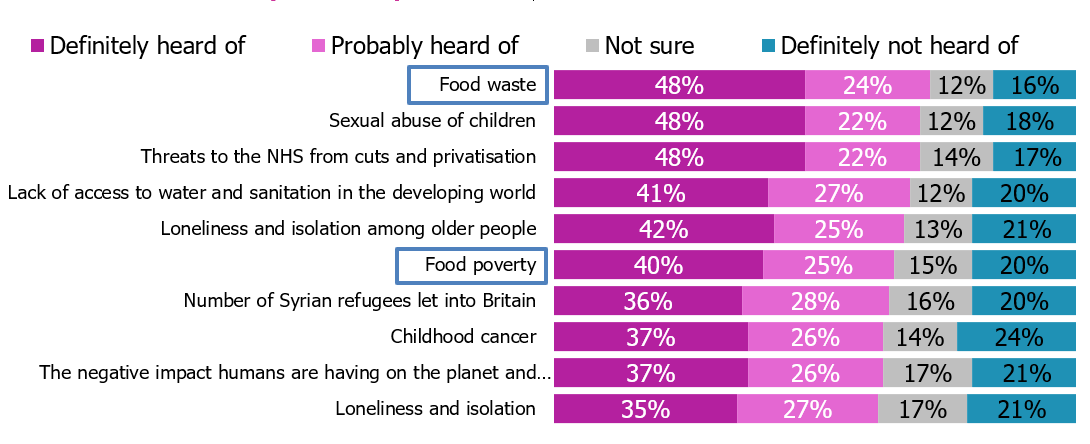Just last week, on the 16th October, the FAO (the UN’s Food and Agriculture Organisation) was celebrating World Food Day, a day of action dedicated to tackling global hunger. It is paradoxical and disturbing to think that while 815 million people are still hungry in the world, 1/3 of the food produced globally for human consumption is lost or wasted each year[1], not to also mention the huge environmental and economic bill associated with this food production.
The public is highly aware and concerned about the food waste problem, yet it is the public themselves who are responsible for a large share of this waste.
In our Charity Awareness Monitor (CAM) data from the July 2018 wave of research, we can see that 72% of the public are aware of the food waste issue. This is also the issue with the highest level of awareness when compared to the series of issues we ask quarterly in our survey (60+ issues asked, around various topics such as health, environment, international development and social welfare). To a lesser extent, the public are also aware of food poverty (65% saying they have definitely or probably heard of the food waste issue), and interestingly as shown by our other CAM measures, food waste is also a concern for 51% of them.
Awareness of Issues – Top 10 Prompted Issues

![]()
![]() Source: Charity Awareness Monitor, Jul 18, nfpSynergy | Base: 1,000 adults 16+, Britain
Source: Charity Awareness Monitor, Jul 18, nfpSynergy | Base: 1,000 adults 16+, Britain
Food waste happening in households is hard to quantify, but few sources such as WRAP (Waste & Resources Action Programme) estimate that “household food waste makes up to 70% of the UK post-farm-gate total”, and that a lot of it is preventable and avoidable[2]. So, what can be done to convert these levels of public awareness and concern into action?
More and more is being done in the UK to tackle the issue, but there is still a need for a much larger and more holistic approach.
A great number of initiatives already exist in the UK, among the most popular one being the “Love food, hate waste” campaign[3] launched by WRAP in 2007, aiming to raise awareness of the issue and help consumers to reduce their food waste by sharing practical advice.
Some other players in the sector are also doing fantastic work such as FareShare, collecting food surplus from higher up in the supply chain to redistribute it to charities who then transform it into meals for those in need. A lot of other digital initiatives now exist in the UK to tackle this issue, such as OLIO[4], connecting neighbours and local shops via an app so that surplus food and other household items can be shared.
However, with no set target or common path, all these isolated actors paddling in different directions may only have a limited impact on their own. I believe that what we need is a deeper cultural shift and change in behaviours, so that recycling and reducing food waste becomes the norm, an automatism, rather than a constant mindful or painful effort. We are all responsible for food wastage, from the producer to the end-consumer, and to this regard we should make food waste a common target.
When the government steps in: the French case
I come from France, where just a few years ago, supermarkets were still bleaching edible food thrown away so that people in need, sometimes foraging in supermarket bins, couldn’t eat it. A scandalous habit that thankfully has now been banned by the French government. Two years ago, a law has been passed, prohibiting supermarkets of a certain size to bin edible food, and making them partner with local charities and foodbanks to donate their food surplus instead.
But maybe the most important thing to take out from this is that this law didn’t come as a stand-alone, but as part of a wider national policy plan involving all parties. The policy also includes educational programmes about food waste & sustainability in schools and businesses, incites supermarkets and other actors to quantify their food waste and be more transparent. And above all of these actions they are supported by consistent national communication campaigns.
While it may be too early to evaluate and quantify the impact of this national policy at the moment, it has already shown some positive results: as a result of the law about 5000 new organisations (charities and foodbanks) have been created to help distribute the food surplus to those in need. A recent study also showed that most supermarkets concerned by the law are now donating their surplus, and most of them now have better stock management processes[5].
This approach, even though it might not be the one and only or best way to tackle the issue, definitely has had the merit to efficiently change the public’s perceptions and laid the groundwork for further change in the country.
The UK has chosen the voluntary rather than the regulatory approach on the topic, which may not be sufficient enough if we want to achieve significant results in food waste reduction. Various solutions can be considered, either by regulating some practices or incentivising others, introducing nationwide educational programmes, increasing support to charities fighting the problem or nudging consumer behaviours.
A more coherent plan from the UK government, however, could increase success in reducing food waste by putting together a holistic plan of action targeting all parties, and setting clear national goals across the entire supply chain. By placing responsibility on everyone from producer to end-consumer this would hopefully set the groundwork to change attitudes and in turn behaviours to reduce food waste.
--
Wondering about your charity brand awareness and the public’s understanding of the issues your nonprofit care about? Our Charity Awareness Monitor is the best thing you can invest in. Download the briefing pack below to find out more.

